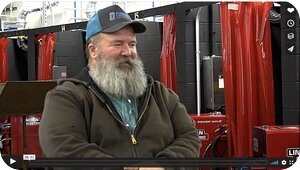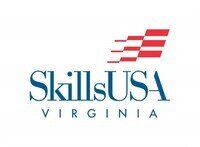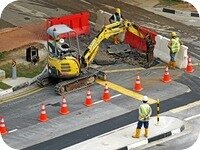Spring is here and I can’t believe March has already come and gone! AGCVA has been so busy advocating, growing and connecting that the time is simply flying. Spring also means the end of membership renewal season. Due to the website and data upgrades, the renewal process has been different than in years past. If your company has not yet renewed, contact any member of the AGCVA team right away. You don’t want to miss all the wonderful things AGCVA is doing to help your company grow and succeed. The final deadline for renewal is Thursday, March 31 at 5:00 p.m.
All updates to your company information must be completed by Thursday, March 31 at 5:00 p.m. for information to be correctly listed in the 2022 membership directory.
The AGCVA Educational Foundation recently met and approved a grant to SkillsUSA Virginia for $25,000. This grant will support the upcoming April competitions at SkillsUSA State Leadership Conference, including material costs, prizes and travel scholarships.
The SkillsUSA State Leadership Conference will be taking place in Virginia Beach on April 9, starting at 8:00 a.m. This event is open to the public and will showcase students in over a dozen construction related contests who are fighting to earn the right to move on to the national competition in Atlanta, Georgia, later this summer.
Small- and medium-sized businesses, including construction firms, are among the most vulnerable, according to experts.
While the supply chain issues will be corrected over time, the labor shortages plaguing the construction industry are expected to intensify.
Multiple forecasts from construction associations and financial institutions indicate an optimistic view of the industry by contractors and dealers in 2022.
Survey shows digital transformation is a priority at 71% of construction companies — and opens up more opportunities for women.
 
|

|

Times are good for contractors, with an active market creating an abundance of work, increasing revenues and business growth. In 2021, President Joe Biden signed a $1.2 trillion infrastructure bill, and over the next five years it will deliver $550 billion of new investments in America’s infrastructure. The law will impact and influence construction across America and will create new opportunities for contractors to profitably grow their businesses — assuming, that is, they don’t spread themselves too thin.
The American Road & Transportation Builders Association said the measure could unravel the revenue structure and transportation funding in the Infrastructure Investment and Jobs Act. That's because the bill would authorize the Treasury Department to use general fund dollars to replace the temporarily lost revenue from the halted gas tax.
 
With an extreme lack of skilled workers in the construction industry, there's never been a more important time to build a diverse and inclusive workforce. Here are some tips to attract women to the industry, beyond just one week a year.
 | |
The Pulaski County High School Career and Technical Education Center, an AGCVA member, held a very special ceremony Wednesday, March 2, to cut the ribbon and officially open a new state of the art welding lab that will be a great benefit to the students, as well as the construction industry.
Welding, which is one of 27 programs in seven different career fields offered by the CTE department, has been a very popular program through the years and has seen consistent growth.
“Students who complete the welding program through Welding III complete their SENSE, Entry-Level Welder Certification through the American Welding Society,” Megan Atkinson said. “Mr. Petty, our instructor, is a CWI (Certified Welding Inspector) and is an adjunct instructor at New River Community College. The students who complete this program are prepared to enter the workforce and hold a good paying job right out of high school.”
Check out the video to learn more about the welding lab. This video was also produced by students in the Pulaski County CTE program.
Technology advancements are better enabling machines to see their surroundings to improve safety in heavy equipment applications.
The Harvard Take Home Study evaluated samples collected in 30 homes of workers living with a child in the greater Boston area to identify potential home exposure. Construction workers' homes had higher levels of arsenic, chromium, copper, lead, manganese, nickel and tin when compared to janitorial and auto workers in the study.
30
Mar 2022
|
10:00 a.m. - 11:00 a.m. | Zoom A no-cost opportunity to engage with other AGCVA members across the Commonwealth.
|
5
Apr 2022
|
7:30 a.m. - 5:00 p.m. | Norfolk Deadline to register: Monday, April 4
|
5
Apr 2022
|
9:00 a.m. - 5:00 p.m. | Providence Forge Deadline to register: April 1 at 5:00 p.m.
|
8
Apr 2022
|
5:00 p.m. - 7:00 p.m. | Virginia Beach Deadline to register: April 4 at 5:00 p.m.
|
14
Apr 2022
|
12:00 p.m. - 1:00 p.m. | Zoom Deadline to register: April 14 at 11:00 a.m.
|
19
Apr 2022
|
4:30 p.m. - 6:30 p.m. | Roanoke Deadline to register: April 14 at 5:00 p.m.
|
20
Apr 2022
|
9:00 a.m. - 10:00 a.m. | Zoom
|
20
Apr 2022
|
11:30 a.m. - 1:30 p.m. | Lynchburg Deadline to register: April 15 at 5:00 p.m.
|
21
Apr 2022
|
4:00 p.m. - 8:00 p.m. | Richmond Deadline to register: April 18 at 2:30 p.m.
|
26
Apr 2022
|
12:00 p.m. - 2:30 p.m. | Newport News Deadline to register: April 25 at 5:00 p.m.
|
28
Apr 2022
|
7:30 a.m. - 9:30 a.m. | Harrisonburg Deadline to register: April 21 at 12:00 p.m.
|
28
Apr 2022
|
Planning for this event is still underway. Click the link below to add this event to your calendar and be on the lookout for more details from us soon.
|
29
Apr 2022
|
11:30 a.m. - 5:30 p.m. | Forest Deadline to register: April 27 at 5:00 p.m.
|
|

















